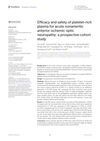 1 citations,
August 2021 in “Canadian journal of neurological sciences”
1 citations,
August 2021 in “Canadian journal of neurological sciences” Woodhouse-Sakati syndrome can cause writer's cramp and other varied symptoms, highlighting the importance of genetic testing for diagnosis.
 1 citations,
August 2021 in “Movement disorders clinical practice”
1 citations,
August 2021 in “Movement disorders clinical practice” A man with Isaac's syndrome affecting only one side of his body improved after immune system-targeted treatment.
 1 citations,
June 2021 in “Cureus”
1 citations,
June 2021 in “Cureus” A girl with hereditary chorea, likely Huntington's disease, had her condition worsened by lupus.
 1 citations,
January 2016 in “Elsevier eBooks”
1 citations,
January 2016 in “Elsevier eBooks” The document concludes that a complete skin restoration biomaterial does not yet exist, and more clinical trials are needed to ensure these therapies are safe and effective.
 1 citations,
November 2015 in “Indian Journal of Clinical Biochemistry”
1 citations,
November 2015 in “Indian Journal of Clinical Biochemistry” The conference presented findings on how vitamin D levels, genetic factors, and lifestyle choices like smoking and yoga affect various health conditions and diseases.
 March 2024 in “Frontiers in medicine”
March 2024 in “Frontiers in medicine” PRP treatment can safely improve short-term vision in acute NAION patients.
 January 2024 in “Biological & clinical sciences research journal”
January 2024 in “Biological & clinical sciences research journal” Apigenin, found in plants and vegetables, has many health benefits, including anti-inflammatory, antioxidant, and anticancer effects.
 January 2024 in “American journal of clinical dermatology”
January 2024 in “American journal of clinical dermatology” Ritlecitinib is safe and well-tolerated for treating alopecia areata in patients aged 12 and older.
 January 2024 in “Regenerative Biomaterials”
January 2024 in “Regenerative Biomaterials” Metal organic frameworks-based scaffolds show promise for tissue repair due to their unique properties.
 January 2024 in “Brazilian Journal of Veterinary Pathology”
January 2024 in “Brazilian Journal of Veterinary Pathology” The horse had a rare disease causing weight loss and skin issues, leading to euthanasia due to poor treatment options.
 December 2023 in “Communications biology”
December 2023 in “Communications biology” Targeting the HEDGEHOG-GLI1 pathway could help treat keloids.
 November 2023 in “Klìtinna ta organna transplantologìâ”
November 2023 in “Klìtinna ta organna transplantologìâ” MSC-derived exosomes can help treat COVID-19, hair loss, skin aging, and arthritis.
 September 2023 in “bioRxiv (Cold Spring Harbor Laboratory)”
September 2023 in “bioRxiv (Cold Spring Harbor Laboratory)” The mTurq2-Col4a1 mouse model shows that cells can divide while attached to stable basement membranes during development.

Female rats showed more panic-related behavior than males, influenced by hormonal cycles and certain drugs.
 February 2022 in “Journal of Armed Forces Medical College”
February 2022 in “Journal of Armed Forces Medical College” The patient with autoimmune hypothyroidism improved after treatment for thyroid and associated conditions.
 January 2022 in “Acta dermatovenerologica Alpina, Pannonica et Adriatica (Tiskana izd.)”
January 2022 in “Acta dermatovenerologica Alpina, Pannonica et Adriatica (Tiskana izd.)” Uncombable hair syndrome causes frizzy hair and can affect the nervous system, eyes, and ears, often co-occurring with other hair, skin, nail, and teeth conditions, and is linked to three specific gene mutations.
 January 2022 in “Medical research archives”
January 2022 in “Medical research archives” Taking vitamin D might improve life for MS patients and reduce skin side effects from alemtuzumab treatment.
 January 2021 in “bioRxiv (Cold Spring Harbor Laboratory)”
January 2021 in “bioRxiv (Cold Spring Harbor Laboratory)” Mothers have more hair proteins than their children, with age-related differences in protein patterns, and some proteins in hair could indicate early childhood development.

The document is a detailed guide on skin conditions and treatments for dermatologists.
 January 2019 in “ISGE series”
January 2019 in “ISGE series” Estrogen helps prevent artery plaque by stopping monocyte capture in blood vessels.
 December 2018 in “Neuroradiology”
December 2018 in “Neuroradiology” MRI helps distinguish between pituitary adenomas and craniopharyngiomas, guides treatment for pediatric CNS tumors, and assesses rhinocerebral mucormycosis with a high mortality rate in transplanted patients.
 July 2018 in “Elsevier eBooks”
July 2018 in “Elsevier eBooks” The most common cause of hair loss in children is tinea capitis, followed by alopecia areata and telogen effluvium.

 January 2018 in “Elsevier eBooks”
January 2018 in “Elsevier eBooks” The document explains how male reproductive hormones work and affect the body.
 January 2017 in “Elsevier eBooks”
January 2017 in “Elsevier eBooks” Antioxidants may help improve mitochondrial health and could be used to treat diseases related to cell damage.

Benign skin tumors need accurate diagnosis to ensure proper treatment.

Low-level laser therapy may help stem cells grow and function better, aiding in healing and tissue repair.
 April 2016 in “Plastic and reconstructive surgery. Global open”
April 2016 in “Plastic and reconstructive surgery. Global open” The supplement highlighted advancements and challenges in plastic and reconstructive surgery, including the impact of smoking, chemotherapy, and new treatments like Tafluprost for hair loss.
 May 2015 in “Endocrinología y nutrición”
May 2015 in “Endocrinología y nutrición” The conclusion is that adult males with muscle weakness and hormonal imbalances should be tested for Kennedy's disease.

Chemicals and stem cells combined have advanced regenerative medicine with few safety concerns, focusing on improving techniques and treatment effectiveness.






























